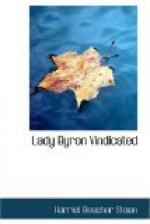2nd, It is very strong evidence of this fact, that Lord Byron, while loudly declaring that he wished to know with what he was charged, declined this open investigation, and, rather than meet it, signed a paper which he had before refused to sign.
3rd, It is also strong evidence of this fact, that although secretly declaring to all his intimate friends that he still wished open investigation in a court of justice, and affirming his belief that his character was being ruined for want of it, he never afterwards took the means to get it. Instead of writing a private handbill, he might have come to England and entered a suit; and he did not do it.
That Lord Byron was conscious of a great crime is further made probable by the peculiar malice he seemed to bear to his wife’s legal counsel.
If there had been nothing to fear in that legal investigation wherewith they threatened him, why did he not only flee from it, but regard with a peculiar bitterness those who advised and proposed it? To an innocent man falsely accused, the certainties of law are a blessing and a refuge. Female charms cannot mislead in a court of justice; and the atrocities of rumour are there sifted, and deprived of power. A trial is not a threat to an innocent man: it is an invitation, an opportunity. Why, then, did he hate Sir Samuel Romilly, so that he exulted like a fiend over his tragical death? The letter in which he pours forth this malignity was so brutal, that Moore was obliged, by the general outcry of society, to suppress it. Is this the language of an innocent man who has been offered a fair trial under his country’s laws? or of a guilty man, to whom the very idea of public trial means public exposure?
4th, It is probable that the crime was the one now alleged, because that was the most important crime charged against him by rumour at the period. This appears by the following extract of a letter from Shelley, furnished by the ‘Quarterly,’ dated Bath, Sept. 29, 1816:—
’I saw Kinnaird, and had a long talk with him. He informed me that Lady Byron was now in perfect health; that she was living with your sister. I felt much pleasure from this intelligence. I consider the latter part of it as affording a decisive contradiction to the only important calumny that ever was advanced against you. On this ground, at least, it will become the world hereafter to be silent.’
It appears evident here that the charge of improper intimacy with his sister was, in the mind of Shelley, the only important one that had yet been made against Lord Byron.




